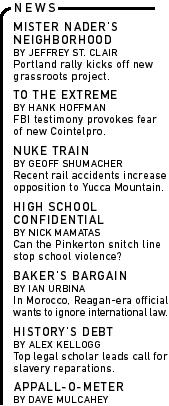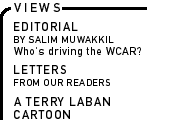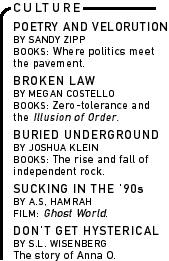|
|

|

|

|
|
|
| |
|
|
|
The Pinkerton Detective Agency has cut a bloody swath through American history. Pinkerton agents were union-busters and kidnappers, and even shot and killed striking workers. Now there's a new addition to the Pinkertons' résumé: high school guidance counselor. In 1999, the Pinkerton Service Group, in conjunction with the Center for the Prevention of School Violence, initiated the "Working Against Violence Everywhere America" program in North Carolina, and is now looking to expand it across the country. WAVE America combines a public awareness campaign, "student-led" initiatives (designed by the Pinkertons) and an anonymous tip line for students to tattle on each other, all to combat school violence. WAVE America was established through the recommendation of former North Carolina Democratic Gov. Jim Hunt's Task Force on Youth Violence and School Safety. Anyone can call in and report on a student they suspect may be violent, or even simply capable of becoming violent. Pinkerton employees interview the caller and determine whether to send the report to the school district. "More than 400 calls were received during the first year of operation," says Joanne McDaniel, acting director of the Center for the Prevention of School Violence. "No guns or plans were revealed, but concerns about bullying, verbal abuse and fighting were reported." WAVE doesn't track the history of the tips it collects and distributes; school districts contact WAVE if the tip leads to a peaceful resolution. School districts have only reported back to WAVE about 35 percent of the time to say that the information gained by the tip led to some sort of peaceful resolution, though many other cases may have been resolved without the district contacting WAVE. The Pinkertons already operate corporate snitch lines. Their AlertLine 800 number encourages employees to rat one another out over theft, threats of violence and other ethical concerns. AlertLine services more than 800 companies, and is accessible to more than 6 million employees worldwide, according to the Pinkerton Web site. AlertLine tips are passed along to management and are also funneled into Esteem Information Services. Esteem is Pinkerton's database of criminal records and other information on employees who may have been dismissed for theft or other violations without ever being legally charged. WAVE America tips are also not checked for veracity, outside of the discretion of the communication specialists working the tip line. What are the guarantees that WAVE tips won't end up in a Pinkerton dossier several years later? McDaniel says that the reports are kept only on paper and destroyed within 90 days, but the Pinkertons themselves are less forthcoming. Asked about the possibility that WAVE information could find its way into Esteem, spokeswoman Tamara Park would only say, "The WAVE America program is designed solely to help reduce incidences of school violence." McDaniel says that WAVE's protocols are based on the Department of Education's report on school violence, "Early Warning/Timely Response." When a student is prone toward violence, he or she often gives off multiple signals--"not just wearing a trenchcoat," McDaniel says. The Department of Education considers "social withdrawal," "excessive feelings of rejection," "feelings of being picked on and persecuted," "expressions of violence in writing and drawings" and even "being a victim of violence" to be warning signs of violence. But they are also warning signs that one is simply a teen-ager. Bestselling horror novelist and former high school misfit Poppy Z. Brite says she "would have been expelled 20 times over" were she in a North Carolina high school today. Brite, who attended Jordan High School in Durham in the '80s, spent those years slammed against walls by rednecks (victim of violence, check), being a disaffected outsider (social withdrawal, check) and writing horror fiction (expressions of violence in writing, check). She would have been vulnerable to the WAVE America snitch line and its criteria for a potentially violent student. Brite "acted out" not through violence, but by publishing the underground school paper, The Glass Goblin. Brite's teachers loved the Goblin even though administrators didn't, and she managed to avoid heavy-handed counseling. Brite went on to a career as the author of Lost Souls and Exquisite Corpse. She explains, "I don't know any successful creative types who weren't freaks and outsiders in high school." "It's ludicrous," says Herbert Gintis, co-author of Schooling In Capitalist America. Gintis isn't surprised that the Pinkertons got into counseling. School exists in the long shadow of work, and reflects the needs of capital. Gintis sees WAVE as "an alternative form of discipline" for schools that, he says, have "under-stressed discipline and responsibility." Since Pinkerton policies are a major feature in thousands of workplaces,
kids need to get used to them now. But like the workplace, the conventional
educational system--where children are trained to compete and are
tracked into different learning environments--just isn't fulfilling
for many students. It isn't surprising that some kids are snapping
under the pressure.
|





